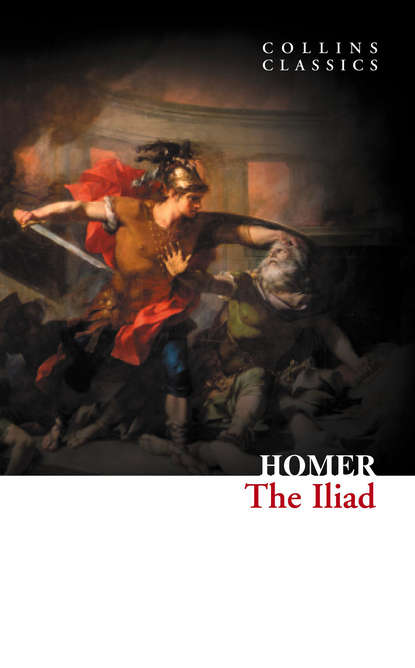скачать книгу бесплатно
Two heralds now, despatch’d to Troy, invite
The Phrygian monarch to the peaceful rite.
Talthybius hastens to the fleet, to bring
The lamb for Jove, the inviolable king.
Meantime to beauteous Helen, from the skies
The various goddess of the rainbow flies:
(Like fair Laodice in form and face,
The loveliest nymph of Priam’s royal race:)
Her in the palace, at her loom she found;
The golden web her own sad story crown’d,
The Trojan wars she weaved (herself the prize)
And the dire triumphs of her fatal eyes.
To whom the goddess of the painted bow:
“Approach, and view the wondrous scene below!
Each hardy Greek, and valiant Trojan knight,
So dreadful late, and furious for the fight,
Now rest their spears, or lean upon their shields;
Ceased is the war, and silent all the fields.
Paris alone and Sparta’s king advance,
In single fight to toss the beamy lance;
Each met in arms, the fate of combat tries,
Thy love the motive, and thy charms the prize.”
This said, the many-coloured maid inspires
Her husband’s love, and wakes her former fires;
Her country, parents, all that once were dear,
Rush to her thought, and force a tender tear,
O’er her fair face a snowy veil she threw,
And, softly sighing, from the loom withdrew.
Her handmaids, Clymene and Æthra, wait
Her silent footsteps to the Scaean gate.
There sat the seniors of the Trojan race:
(Old Priam’s chiefs, and most in Priam’s grace,)
The king the first; Thymoetes at his side;
Lampus and Clytius, long in council tried;
Panthus, and Hicetaon, once the strong;
And next, the wisest of the reverend throng,
Antenor grave, and sage Ucalegon,
Lean’d on the walls and bask’d before the sun:
Chiefs, who no more in bloody fights engage,
But wise through time, and narrative with age,
In summer days, like grasshoppers rejoice,
A bloodless race, that send a feeble voice.
These, when the Spartan queen approach’d the tower,
In secret own’d resistless beauty’s power:
They cried, “No wonder such celestial charms
For nine long years have set the world in arms;
What winning graces! what majestic mien!
She moves a goddess, and she looks a queen!
Yet hence, O Heaven, convey that fatal face,
And from destruction save the Trojan race.”
The good old Priam welcomed her, and cried,
“Approach, my child, and grace thy father’s side.
See on the plain thy Grecian spouse appears,
The friends and kindred of thy former years.
No crime of thine our present sufferings draws,
Not thou, but Heaven’s disposing will, the cause
The gods these armies and this force employ,
The hostile gods conspire the fate of Troy.
But lift thy eyes, and say, what Greek is he
(Far as from hence these aged orbs can see)
Around whose brow such martial graces shine,
So tall, so awful, and almost divine!
Though some of larger stature tread the green,
None match his grandeur and exalted mien:
He seems a monarch, and his country’s pride.”
Thus ceased the king, and thus the fair replied:
“Before thy presence, father, I appear,
With conscious shame and reverential fear.
Ah! had I died, ere to these walk I fled,
False to my country, and my nuptial bed;
My brothers, friends, and daughter left behind,
False to them all, to Paris only kind!
For this I mourn, till grief or dire disease
Shall waste the form whose fault it was to please!
The king of kings, Atrides, you survey,
Great in the war, and great in arts of sway:
My brother once, before my days of shame!
And oh! that still he bore a brother’s name!”
With wonder Priam view’d the godlike man,
Extoll’d the happy prince, and thus began:
“O bless’d Atrides! born to prosperous fate,
Successful monarch of a mighty state!
How vast thy empire! Of your matchless train
What numbers lost, what numbers yet remain!
In Phrygia once were gallant armies known,
In ancient time, when Otreus fill’d the throne,
When godlike Mygdon led their troops of horse,
And I, to join them, raised the Trojan force:
Against the manlike Amazons we stood,
And Sangar’s stream ran purple with their blood.
But far inferior those, in martial grace,
And strength of numbers, to this Grecian race.”
This said, once more he view’d the warrior train;
“What’s he, whose arms lie scatter’d on the plain?
Broad is his breast, his shoulders larger spread,
Though great Atrides overtops his head.
Nor yet appear his care and conduct small;
From rank to rank he moves, and orders all.
The stately ram thus measures o’er the ground,
And, master of the flock, surveys them round.”
